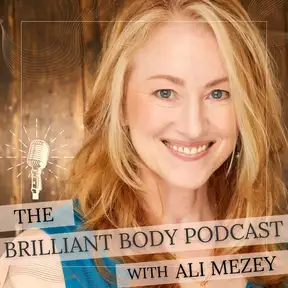Trauma and the Body with Amber Gray: Regulation, Restoration, & The Patience of Whales
CONTENT HEADS UP:
Be enriched by a thoughtfully crafted conversation where sensitive topics related to trauma, torture, and self-loathing are gently woven into a narrative that is ultimately about love. There are no graphic descriptions of torture, just some causes and effects, but we nonetheless recommend that sensitive listeners prioritize their well-being and engage at their own discretion/pace. Also, for those intrigued by the idea of swimming with whales, a friendly reminder to follow safety guidelines and never venture alone into such deep waters.
SYNOPSIS:
Join us in this episode as we connect with Amber Gray, a masterful Human Rights Psychotherapist and Somatic and Dance/Movement Therapist with over 25 years of experience. Through her profound insights gained from working with survivors of trauma, particularly torture, war, and human rights abuses, Amber shares invaluable lessons and practices.
Ali and Amber explore the profound lessons Amber has gleaned from her work with both whales and torture victims, professors and shamans, including the complexities of dissociation, what traditional trauma recovery misses, and the impactful ability to shift one's state of being.
Amber's integrative approach, which merges refugee mental health and torture treatment with creative arts, mindfulness, and body-based therapies, offers a unique perspective on healing. The discussion also delves into the innovative Restorative Movement Psychotherapy, a resiliency-based framework co-created by Amber and her clients, designed specifically for trauma survivors in diverse cultural contexts.
Exploration Points:
- Amber talks about the lessons we can learn from whales, including their social dynamics, communication skills, patience and ability to adapt to changing environments and how whales' enduring nature serves as a metaphor for resilience and persistence in navigating life's challenges.
-Ali and Amber examine the psychological factors and societal influences that contribute to people's capacity to commit acts of torture, shedding light on the complex nature of human behavior.
- Amber shares insights into the adaptive function of dissociation in coping with trauma, highlighting its role in preserving mental and emotional well-being during overwhelming experiences.
- Ali and Amber reflect on the origins and manifestations of self-loathing, its psychological impact, and strategies for cultivating self-compassion and acceptance.
- Amber sheds light on the concept of “restoration” as a more holistic approach to healing after trauma, emphasizing the integration of past experiences and the cultivation of a renewed sense of self in the ongoing process of restoration and healing after trauma, emphasizing the journey of growth and resilience rather than a simplistic and erroneous, notion of "recovery."
- Amber shares techniques for the power of state shifting: Exploring various tools and practices, such as mindfulness, somatic experiencing, and creative expression, for managing emotional states and promoting healing in the face of adversity.
MORE ALI MEZEY:
Website: https://www.alimezey.com
MORE AMBER GRAY:
Website: https://ambergray.com/
BIO:
Amber is a Human Rights Psychotherapist and a Somatic and Dance/Movement Therapist who has worked with survivors of interpersonal, collective and intergenerational trauma, particularly torture, war, and human rights abuses, for 25 years. Amber provides clinical and transformational training on her Right to Embody trainings integrating refugee mental health and torture treatment with creative arts, mindfulness, and body-based therapies for programs serving survivors worldwide. She, with her clients, created a resiliency-based framework and clinical approach (Restorative Movement Psychotherapy) for somatic and movement therapies with survivors of trauma in multi-cultural contexts, and they also co-created Polyvagal-informed Somatic and Dance/Movement therapy, based on 24 years immersion in Polyvagal Theory. The latter is the subject of her upcoming book, Roots, Rhythm and Reciprocity, to be published by Norton. She regularly facilitates WildZeNess Eco-somatic Body of Change retreats for survivors, and caregivers and practitioners, serving communities affected by injustice, oppression and trauma.
RESOURCES:
Gil episode: THE BODY AS A GIFT: A REVERENTIAL JOURNEY INTO THE HUMAN BODY
GIL HEDLEY’S NERVE TOUR
CONTINUUM MOVEMENT: Founder, the brilliant Emilie Conrad, gives an introduction.
ASHES AND SNOW
GIL HEDLEY’S NERVE TOUR
CONTINUUM MOVEMENT: Founder, the brilliant Emilie Conrad, gives an introduction.
ASHES AND SNOW
VoDou: “ Vodou is both a religion and a way of being. It is a uniquely Haitian religion; an amalgam of the religions and traditions originating in and on the Continent, that arrived to Haiti’s shores with the ships carrying those enslaved and stolen from their land. To learn more read Mimerose Beaubrun's book Nan Domi
IFS - Internal Family Systems
Body-Mind Centering/Bonnie Bainbridge Cohen
The Blue Mind by Wallace J. Nichols
Video Talk by David Eagleman on the Live-wired Brain
The Blue Mind by Wallace J. Nichols
Video Talk by David Eagleman on the Live-wired Brain
TO SEE AMAZING PHOTOS OF AMBER AND THE WHALES, GO TO www.thebrilliantbodypodcast.com…
[From time to time, a word or phrase goes wonky. Please forgive my wandering wifi.]

